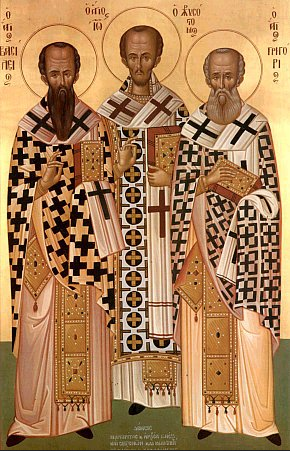Editor’s note: The following comprises the third chapter of Defenders of the Faith: The Christian Apologists of the Second and Third Centuries, by the Rev. Frederick Watson. M.A. (published 1879).
CHAPTER III
Defenders of the Faith
How was the mighty work accomplished? That is the next question we have to discuss. Of course Christians are quite ready with their answer. The words of our hymn come into our mind at once. We think of the great army with its blood-red banner, and Christ at the head. We picture our soldiers conquering by suffering and death through His help.
Mocked, imprisoned, stoned, tormented,
Sawn asunder, slain with sword,
They have conquered Death and Satan
By the might of Christ the Lord.
“By the might of Christ the Lord.” Yes, that was the secret of the triumph of the Church over the world. Christ was in her; hence her might and hence her victory. The Divine Life in the Church was not more real in Apostolic times than after they had long fallen on sleep. Christ’s promise remained firm, “Lo, I am with you alway, even unto the end of the world,” and therefore was the victory won.
But this answer though true is not complete. “By the might of Christ the Lord” has been the secret of the triumph of the Church in all ages of her history, whether Apostolic, Primitive, Mediaeval, or Modern. Yet, as we know, Christ’s might has been manifest in many different ways. So we have still our question to answer. We want to know how the Divine energy was exerted — what human means was employed for the great end.
The Church of Jesus Christ had in early times, as in the present day, many different works, and many different kinds of workmen.
Her great work then, as now, was the conversion of souls. This was done, not so much by the reading as by the telling of the Gospel story. Teachers were many, but books were few. This oral teaching was given not to great assemblies, but to individuals. Persecution soon put a stop to public preaching. And the way the Christians gained a hearing and a credence for this individual teaching was not so much by the power of working miracles, though some seem to have had it; nor by their pure and holy lives, though that too attracted attention; the Christians gained more hearers by their deaths than by their miracles or by their lives. As the grass from the mowing, so sprung up the Christians with fresh vigour when cut down. From the scene of terrible suffering patiently borne, the heathen went away predisposed to learn the source of such a mighty power of endurance, and to listen to the story of the Cross. It was felt that such heroes must be in possession of a secret of strength hidden from the rest of the world.
The next work of the Church was to build up souls in the most Holy Faith. This was done in the secret assemblies for worship, which met at dead of night, and which were liable at any moment to be surprised, and, as a matter of fact, were often surprised by the authorities and the Roman soldiers. With their lives in their hands, the Christians came to these to be made partakers of Christ by the ministry of the Word and Sacraments. At these was the reading of the Scriptures, prayer, thanksgiving, giving of alms, instruction and exhortation, administration of the Sacraments — in early times the Agape or Love Feast.
But the Church had a work beyond the extension of her borders and the intensifying of the Divine Life within her members. She had to vindicate her position in the eyes of men. It was necessary to put before the world generally, and the State authorities particularly, what Christianity really was. Christianity was a new religion, in length of duration it could not compare with the religions of the gods and of the nations. It was a strange religion, quite differing in kind from any other, without temples, images, altars, or sacrifices, or at least any that could be seen. It was a secret religion, the assemblies were at night, and none but its baptized members were admitted to them. It was a religion spreading every day amongst all classes, but especially amongst the women, the ignorant, and the criminal. It was a religion against which accusations of the most serious kind were made; the Christians were accused of being grossly immoral, atheists, traitors to the Emperor and the State, and unprofitable citizens. Even if these charges were not true, they could not be acquitted of incredible folly and of being led away by a wild enthusiasm.
It was evidently quite necessary that these charges should be refuted. The Christians were bound to remove all these preliminary obstacles in the way of their success. Before the heathen could be converted to the faith of Christ, they had to be convinced that the Christians were not immoral, or atheists, or traitors. They had to be shown that at least there was some ground for Christian hope, and some excuse for what seemed to be incredible folly. So a class of men arose commonly called Apologists, that is to say, Defenders of the Faith, who made it their business to give the unconverted heathen some true notion of Christianity, to give them just that superficial view which an unbeliever was capable of taking. Strike, if strike you must, say these men to the heathen, but hear us first. Do not exterminate us from off the face of the earth till you know a little more about us. Do not be so unjust as to condemn us unheard. You punish us simply for being Christians, but surely there is nothing in a mere name. You have vague ideas we are very wicked people, but you are mistaken, our lives are pure, we worship God, and we are loyal to the Emperor. Such was the work of the Defenders of the Faith; their object is not to teach truth, but to prepare the way for teaching. They do not prove that Christianity is true, they only prove that it is not utterly unreasonable or noxious. They remove stumbling-blocks and excite curiosity. In consequence, they rarely quote the Holy Scriptures. They refer to them, of course, constantly. They speak of their antiquity as extending far beyond all other books. They remark on their purity, contrasting them in this respect with the legends concerning the heathen gods. They describe their harmony and simplicity, contrasting them here with the hard and contradictory utterances of the philosophers. They assert the fulfilment of prophecies of undoubted antiquity, in the life of Christ and the establishment of His religion. But they do not appeal to them as authoritative. The heathen, for the most part, had never seen them, and if they had, did not believe in them. The Apologies are written to conciliate enemies, and so the arguments are such as he would allow.
The Apologists, or Defenders of the Faith, are then men living in the 2nd and 3rd centuries, who give the heathen true notions concerning Christianity. The earliest of them lived when persecution was just beginning. Quadratus and Aristides presented apologies to the Emperor Hadrian about the year 120 A.D. Neither of these books is now extant; but Eusebius tells us concerning Aristides, that he was a man faithfully devoted to the religion we profess, and that his work had been preserved by many up to his days. And with respect to Quadratus, he says that he wrote because certain malicious persons attempted to harass our brethren, and that his work, still existing, gave evident proofs of the understanding and the apostolic faith of the writer. Quadratus was able to appeal to the testimony of those who had seen the men on whom Christ’s healing power had been exerted. Some of these had lived even to his times.
The last Defender was Lactantius. He outlived the times of persecution, and wrote an account of the deaths of the last persecutors. He was tutor to the son of the first Christian emperor, and from his eloquence he was honoured with the title of the Christian Cicero.
The Defenders of the Faith in the 2nd century were philosophers, and wrote in Greek. The Defenders of the Faith in the 3rd century were Africans by country, lawyers or rhetoricians by profession, and wrote in Latin.
Some of the Defences were intended to advocate the Christian cause before emperors and rulers of the provinces. Thus Quadratus and Aristides addressed Hadrian; Justin Martyr — Antoninus Pius; Athenagoras, Melito, and Apollinaris — Marcus Aurelius; Tertullian and Cyprian — African governors. Others were addressed to private persons or the public generally. Thus Theophilus of Antioch wrote three letters to Autolycus, a heathen. Tatian addressed the Greeks; Tertullian and Arnobius, the nations; Justin Martyr, the Jews. More commonly the Defence is made against popular clamour and to remove all pretexts for persecutions; but one book, the “Defence of Origen,” is a reply to a book called “The True Word,” an attack on Christianity written by the philosopher Celsus.
When we come to inquire what results these books produced, we find very slight material for forming an opinion. Antoninus Pius is said to have put a stop to persecution after reading Justin’s Apology, but the story is of doubtful truth. Like most other Christian work, the work done by the Defenders of the Faith is hidden from the eyes of men. Still, it must not be denied, that books had not the great influence then they have now. Every single copy had to be made by hand. Some of the greatest works only existed in one copy. But this we may say with confidence, whatever good the works of the Apologists did the Christian cause in their day, they will certainly do us great good in our day. They give us such a wonderful picture of Christian life and the Christian society in those early times; and they convince us of the mighty works which may be wrought by those who with all their heart and soul trust in Christ the Lord.
The Defenders of the Faith give us a picture of the darkness which covered the earth, and the gross darkness which covered the peoples, before the true Light came into the world. Then they picture to us Light and Darkness struggling together, and little by little the Light conquering, and shining more and more unto the perfect day. We need the testimony of those who, with enlightened eyes, saw the darkness before the dawn, to tell us how great that darkness was. It was a shame even to speak of those things which were done of the heathen, not only in secret but in public, not only in their games and shows, but also at their most solemn religious festivals, and in the temples of their gods. The Defenders of the Faith tell us of this, and they tell us, too, how Christianity came into a dark and corrupt world and brought with it new light and life. Old bonds were being dissolved, but Christianity established a new brotherhood, of whose members it was said that they loved one another even before they knew one another. Men were enslaved by their lusts and passions, but those whom Christ set free were free indeed. The world was without hope beyond the grave; Christians despised death in the certainty of a happy resurrection.
Thus the Defenders of the Faith tell us what a power Christianity has, and wherein that power consists. We, in our day, as we know, have the same source of strength that they had. When we read what they did, we rise comforted with the thought that Christ’s grace is sufficient for us also. If the Roman Empire could not destroy the Church in its infancy, no action of the State can destroy the Church in its mature strength.
And now let us consider our subject more particularly in four chapters. The Christians were attacked, and the Apologists defended them; so the first chapter will be The Defence. As we learn from military tactics, no army can be successful which stands only on the defensive, and the Christians, we know, had to wage an aggressive war; so the Apologists in their turn made an attack on the heathen religion and philosophy; hence the second chapter will be The Attack. Besides this, the Apologists give us, by the way, much interesting information concerning themselves and their religion; so the third chapter will be Christians and Christianity. Lastly, leaving Apologetic literature as a whole, we shall consider the different Apologies with their Authors separately; so our fourth and fifth chapters will be The Latin and Greek Apologists and their Apologies.
(Go back to previous chapter)
(Continue to next chapter)










4.5